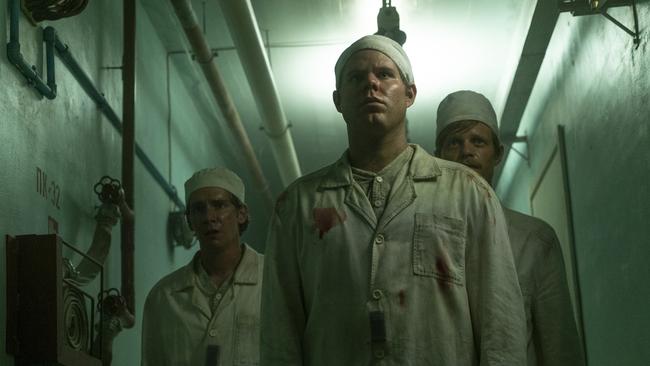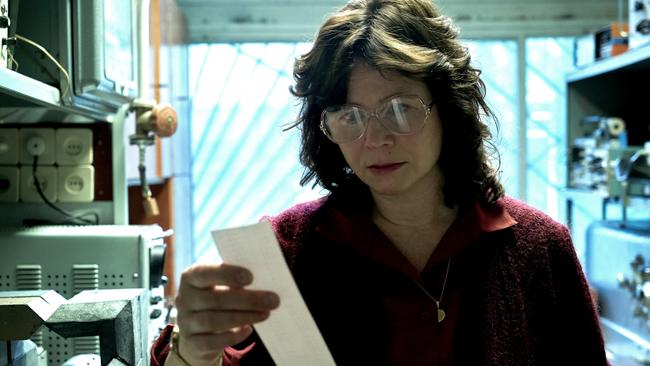Money and power didn’t stop Chernobyl disaster. We must learn
The Chernobyl TV series is being described as the highest-rated show of all time, possibly because it depicts men in power who refused to accept the knowledge, proven science and warnings of lauded experts, writes Dr Karen Brooks.
Rendezview
Don't miss out on the headlines from Rendezview. Followed categories will be added to My News.
The television series, Chernobyl, based on the catastrophic explosion of the Chernobyl Power Plant near the Ukrainian city of Pripyat in April 1986 and its aftermath, is being described as the highest-rated show of all time on IMDb (the Internet Movie Database).
Beating Game of Thrones and the David Attenborough documentary, Planet Earth, it’s captivating and horrifying viewers in equal measure.
So why has a show of this nature drawn so many viewers and hyperbolic praise? While the superb cast and settings as well as the admix of horror, dystopian narrative, realism, drama and documentary contribute to its authenticity, it could be the underlying theme of science versus wilful ignorance that resonates so strongly with modern viewers.
MORE FROM KAREN BROOKS: The age of making innocent mistakes is over
The nature of Soviet geopolitical relations in the 1980s meant they went to great lengths to cover up the Chernobyl cataclysm, particularly in the initial stages.
But this doesn’t completely account for the ongoing, stubborn stance of those who could make a real difference — men in power who refused to accept the knowledge, proven science and thus warnings of lauded experts.
Instead, they chose to wield their authority, no matter what the cost. This included the lives of men they sent knowingly to, not only their agonising deaths, but future illness and suffering, despite both eyewitness accounts and specialist evidence.
One exchange between characters highlights this issue. In the wake of the explosion, eminent scientist Ulana Khomyuk (played by Emily Watson) presses to have iodine tablets issued to everyone and the city evacuated.

She’s silenced by an official, who rejects there’s a problem with one exception — scientists, who he accuses of being fearmongers.
Khomyuk says: “I’m a nuclear physicist. Before you were deputy secretary, you worked in a shoe factory.”
MORE FROM KAREN BROOKS: Game of Thrones: A better show we couldn’t have asked for
The deputy, Garanin, replies: “Yes, I worked in a shoe factory. And now I’m in charge … ”
Like the endangered characters that populate the bleak landscape of this version of Chernobyl, we too now are beholden to those in power, regardless of their education, expertise or the fact they can either choose to believe in/act upon what suits their political agenda, whatever the evidence, or dismiss it altogether.
While education and even expertise doesn’t guarantee wisdom, those granted power should at least possess the intelligence to know when to defer to greater knowledge and experience.
Too often, they don’t, listening instead to those with different power and/or money.

We’re also being told “everyone has a right to an opinion”. But having a right to an opinion doesn’t make that opinion correct. Yet, these days we’re treating not only opinions (and “feelpinions”) as fact, we’re substituting them for irrefutable information and data collection. Why? Because they appeal to a populist agenda, often arousing fear and anger.
MORE FROM KAREN BROOKS: Conspiracy theories are just lies spread by attention seekers
Just like the authorities in 1980s Soviet Union are depicted as doing in Chernobyl, if our leaders and various dominant commentators don’t believe something is a priority, it’s not addressed or it’s marginalised. Worse, those championing these things as important are debased, name-called and mocked and, as a consequence, truth is obfuscated.
In the show, a frustrated vice chairman of the Council of Ministers, Boris Shcherbina, played by Stellan Skarsgard, says after the explosion and mounting evidence of long-term risk: “The official position of the state is that a global nuclear catastrophe is not possible in the Soviet Union … ”
By actively demeaning and trying to discredit experts and facts, we’re giving ourselves permission to take very little or no action.
Never seen before realistic portrayal of a man-made disaster, dramatized accordingly for creating a mega impact and upgrading the taste for TV Series, HBO's newest miniseries #Chernobyl shines like the brightest star in the entire galaxy. #ChernobylHBO is a riveting MASTERPIECE. pic.twitter.com/gnLOUVDI1w
— Pallav Gogoi (@pallav_) May 23, 2019
By pretending negative effects are “not possible”, we’re more like the witless people of Pripyat than we realise: at the mercy of those in power.
MORE FROM RENDEZVIEW: If our PM won’t tackle climate change, I guess I’ll have to
You have to ask why are facts and science now, as they were in the Soviet Union in 1986, being actively degraded? What or whose purpose does it really serve? Since when are these something that can be cherrypicked — as if one’s choosing from a menu?
Why is their value (or otherwise) contingent on whether or not it suits an agenda and guarantees an individual or party remaining in power/work? Why are we allowing emotions, feelings and opinions to trounce rational discussion and solutions based on facts?
Are we headed for disaster? Rebecca Nicholson writing in The Guardian, believes Chernobyl provides a salient lesson for contemporary audiences. It warns us that, “The rejection of scientific knowledge, of experts, has terrible consequences.”
The dreadful and sad irony is, those consequences will affect everyone, including those who think they know better than the real experts.
Chernobyl is available to stream on Foxtel On Demand.
Dr Karen Brooks is an honorary senior researcher at IASH at the University of Queensland.
Originally published as Money and power didn’t stop Chernobyl disaster. We must learn


